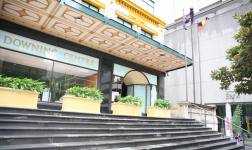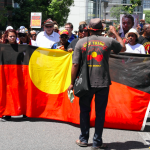The Push for Mandatory Consideration of Aboriginality During Sentencing

In the 2013 case of Bugmy versus the Queen, the High Court of Australia found that social disadvantage should be taken into account during the sentencing process. The court ruled that Aboriginal man William Bugmy’s deprived background should have been seen as a mitigating factor when his penalty was being formulated.
The High Court also found that Indigenous social disadvantage is no different from any other form, and should not be given special treatment by the courts.
However, the NSW Bar Association recommends that courts be required to consider Aboriginal or Torres Strait Islander background during the sentencing process, and that each state and territory should pass legislation to facilitate this.
Skyrocketing Indigenous incarceration
The Bar Association made this recommendation, among others, in its submission to the Australian Law Reform inquiry into the incarceration rate of Aboriginal and Torres Strait Islander peoples (‘the inquiry’).
The submission was prepared by a joint working party, which included former District Court judge Stephen Norrish, former NSW attorney general Bob Debus and chair of Just Reinvest NSW Sarah Hopkins.
The inquiry was announced in October last year by Australian attorney general George Brandis to address the ever-increasing Indigenous incarceration rate in this country, and to consider possible reforms.
In June this year, there were 11,456 First Nations people detained in Australian prisons. Aboriginal and Torres Strait Islander people now make up 28 percent of the adult inmate population, while accounting for a little over 2 percent of the overall Australian adult population.
In recognising that Indigenous people “continue to experience widespread disadvantage,” the authors of the submission set out a series of recommendations designed to reduce the number of First Nations peoples behind bars.
Sentencing and Aboriginality
The Bar Association recommends that all jurisdictions around the country pass legislation as a matter of urgency requiring courts “to consider the unique systemic and background factors affecting Aboriginal and Torres Strait Islander peoples when sentencing”.
These provisions, it submits, should focus on reducing the number of Indigenous prisoners, providing reparations to the victims and the community caused by the offending, restoring harmony to Indigenous communities and ensuring equal justice in sentencing decisions.
The Association calls for legislative framework to facilitate restorative justice programs to complement the current sentencing system. Such moves, it argues, would help validate existing values and practices of many Indigenous communities.
Judicial discretion
The submission asserts that by considering an individual’s background, judicial officials could gain a better understanding of its impact, which may in turn inform the sentencing process – including the assessment of moral culpability.
The submission also recommends that a Gladue style report be provided to judicial officers prior to sentencing. This is a report about an individual’s background used in Canada when sentencing Indigenous people. It aims to acknowledge and assess the intergenerational disadvantage that leads to reoffending.
Abolishing mandatory sentences
The submission further recommends that all state and territory governments review mandatory sentencing regimes, with a view to repealing them.
The joint working party outlines that mandatory sentences disproportionately impacts Aboriginal and Torres Strait Islander people. For example, in 2013, 16 percent of Indigenous inmates were incarcerated for fine default as a result of mandatory sentencing laws.
The submission calls for the repeal of mandatory sentencing for default of fine payments, along with property and driving offences, pointing out that existing regimes have unfairly resulted in the incarceration of large numbers of First Nations peoples.
It also recommends that as mandatory sentencing provisions are repealed, a number of additional community-based sentencing options be introduced.
Short sentences
According to the authors, short sentences are ineffective in rehabilitating offenders or reducing recidivism, as those serving such sentences have little access to rehabilitation programs on the inside.
The Bar Association proposes that sentences of six months or less be limited to offenders who pose a risk of to the community, and that alternative community-based options be provided, including a revised version of the intensive correction order (ICO) model.
The updated ICO model would include a focus on rehabilitative and violent offending programs to replace the work component, which would aim to address the underlying causes of offending, as many who are deemed unfit for the work component have alcohol or drug dependency issues.
The maximum length of ICOs, it argues, should be extended beyond two years to accommodate for situations where an offender has good prospects of rehabilitation but a sentence of greater than two years is warranted. Laws should be enacted to ensure ICOs can be ordered in all jurisdictions, and resources provided to set up facilities enabling all regional and remote courts to make the orders.
Overhauling the bail system
The Bar Association considers bail law reform as a key area for attention when it comes to reducing Indigenous incarceration rates. It recommends that Aboriginal and Torres Strait Islanders peoples’ backgrounds be considered by bail authorities.
New measures should be enacted, it recommends, to ensure that less First Nations peoples are refused bail, and to prevent the imposition of “unrealistic conditions” which only set up Indigenous people, “in particular, to fail.”
Amongst the recommended reforms to bail laws, the Bar Association includes eliminating the possibility of minor offence reoffending as a reason to refuse bail. The joint working party points out that it is a widely acknowledged fact that Indigenous defendants are at risk of committing minor offences.
Another reform recommendation is that courts should refrain from refusing bail due to the unavailability of adequate accommodation. This measure is suggested in particular for children, as this should be a child welfare issue, rather than one for the criminal justice system.
The authors recommend a halt to the requirement that an Indigenous person be held in custody while bail deposits of less than $1,000 are being sought. And also preventing armed police officers from conducting curfew checks at an individual’s residence in the middle of the night.
The desperate need to act
The Bar Association notes with some concern that the funding for Aboriginal and Torres Strait Islander legal services have not kept up with the heightened demand for these services, nor for the increased cost of them.
The submission also makes a number of recommendations in regards to working in collaboration with Indigenous communities and organisations in reinvigorating First Nations peoples’ legal systems, as well as investing in Justice Reinvestment programs.
The Australian Law Reform inquiry is set to deliver its report to the attorney general on December 22 this year.
It is hoped that the undertaking will lead the government to actually implement reforms that have a positive impact on reducing the Indigenous incarceration rate in Australia, which NSW Bar Association president Arthur Moses has described as a “national shame.”
However, it must be remembered that the Royal Commission into Aboriginal deaths in custody delivered its report in 1991. Of the 339 recommendations made, the majority were never implemented.
And since that time, the proportion of the overall Australian prisoner population made up of Aboriginal and Torres Strait Islander peoples has doubled from 14 to 28 percent.








